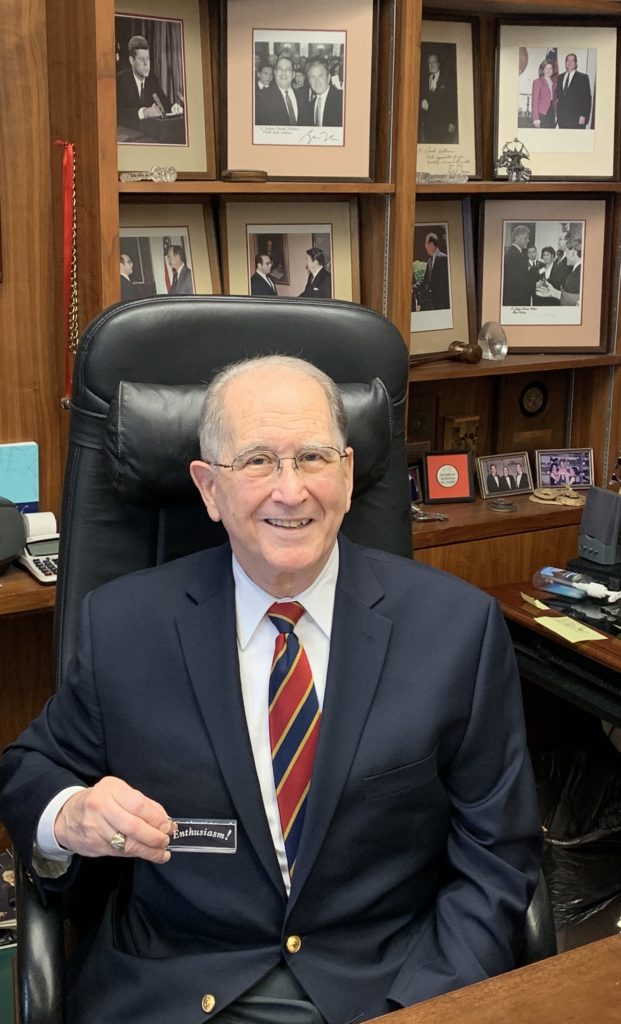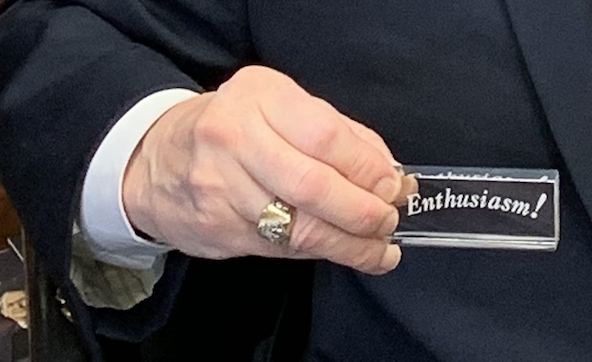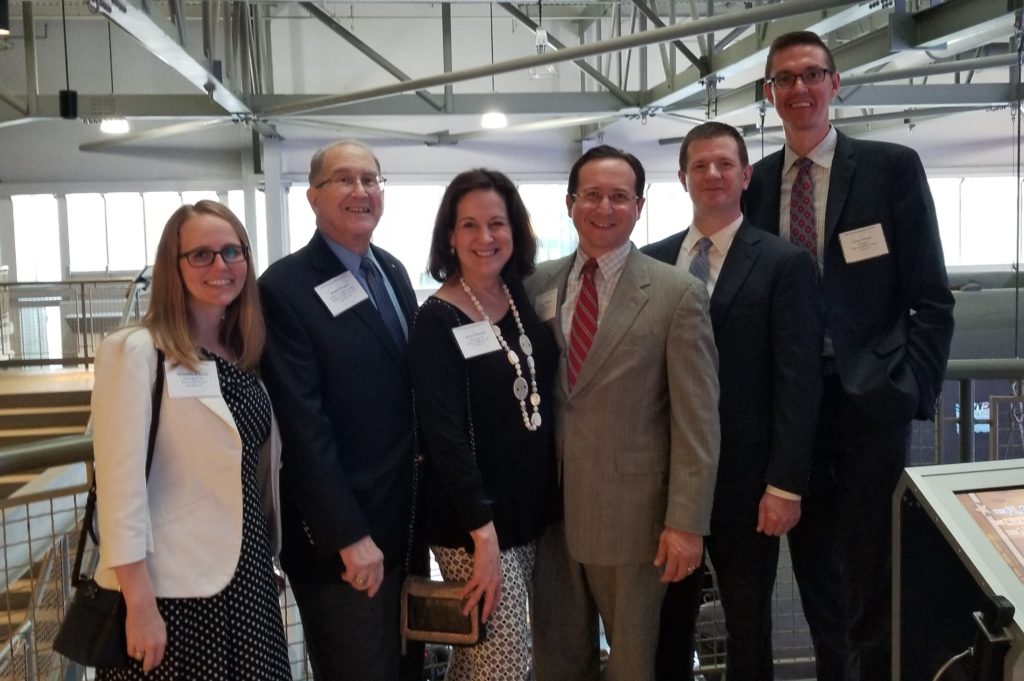
Judge David Hittner
Do you have enthusiasm for your job? Do you often laugh at work?
U.S. District Judge David Hittner, who was appointed to the federal bench in the Southern District of Texas in 1986, certainly does.
Indeed, he believes enthusiasm and humor are imperative to happiness in the practice of law, as well as in all professions. And being prepared is the key to success in the courtroom.
Enthusiasm is so important to Judge Hittner that 20 years ago he commissioned the production of a rectangular, glass paperweight with the word “ENTHUSIASM!” etched onto it.
He has kept it on the front ledge of his desk, in the very center, ever since. It serves as a constant reminder to be enthusiastic about whatever you are doing. As he explains: “No matter what you do for a living, you need to be enthusiastic. It is an important personality trait.”

Judge Hittner has gifted the same “ENTHUSIAM!” paperweight to 120 of his friends, colleagues and acquaintances over the years who share his enthusiasm. This includes attorneys, medical doctors, congressional staff persons, journalists, members of the clergy, an anthropologist, dancing instructors, office secretaries, restaurant owners and a U.S. Supreme Court justice (among others). Many keep it on the front of their desks, too.
Judge Hittner has so much enthusiasm for his job – particularly for presiding over jury trials – that he keeps a full caseload even though he could reduce his caseload or altogether retire with full pay as a “senior” judge.
Note: Haynes and Boone is the sponsor of appellate coverage for The Texas Lawbook. Earlier judicial profiles by Haynes and Boone authors can be found here and here.
Not only does he have a full caseload, he also has the most active jury trial docket in the Southern District of Texas, often trying cases for other judges when they have scheduling conflicts. In the two years before the pandemic hit, he presided over 33 jury trials.
Why try so many cases?
Because he loves doing so. There is no place he would rather be than in the courtroom. And he says he is a “firm believer in the jury system” and thinks “everyone is entitled to their day in court.”
There are many reasons for the so-called vanishing jury trial throughout the country, including the increase in summary judgments, contracts with arbitration clauses and court-encouraged mediation.
To Judge Hittner’s mind, though, extremely long and complicated summary judgment motions might suggest that there is truly a fact issue that should be tried to a jury and that at some point extensive discovery needs to end and the case needs to be tried.
Trying cases also has the incidental effect of giving attorneys jury trial experience, which can be hard to come by these days.
“True trial attorneys,” he explains, are unfortunately becoming harder to find.
Trying cases also gives law clerks and interns opportunities to observe trials. His clerks finish a clerkship having been involved in more jury trials than some litigation partners at law firms, and certainly more than most associates. Experience is invaluable not only to attorneys’ careers but to clients. Attorneys who lack experience going to trial may be reluctant to do so, which further contributes to the overall decline in the number of jury trials.

The author (left) and Judge Hittner with current and former Haynes and Boone lawyers at Fifth Circuit Conference
People often ask Judge Hittner: “Which case has been your favorite?”
His resounding answer is a case that involved racial gerrymandering of Texas’ Congressional districts, because the case involved a combination of two of his passions: law and political science. He served on a three-judge panel that held three districts, as drawn by the state Legislature in 1990, were unconstitutional because of racial gerrymandering. He filed a special concurring opinion on religious gerrymandering. The decision was affirmed by the Supreme Court twice.
He has also presided over many interesting trademark infringement trials, including a suit by various national golf courses against Tour 18 golf course for copying famous golf course designs and a suit by Crown Royal whiskey against a competitor that also sold whiskey in bags. Another notable case was the six-week trial of R. Allan Stanford for financial fraud, which is the largest “Ponzi” scheme case to be tried in federal court.
Outside of the courtroom, Judge Hittner has a variety of other passions. He is active in the Boy Scouts, serving locally on the local council’s board of directors and nationally as a voting delegate to the national council (although at his age he no longer treks through the woods with the troop). An avid member of the Masons, he recently received the Thirty-Third Degree with Grand Cross, which is the highest Masonry honor in the world and has been bestowed upon less than 100 living members worldwide.
He also plays acoustic 12-string and electric bass guitars in a country-western band, the Texas Bar Flies, with two practicing attorneys and a law professor. He keeps up his skills with weekly bass guitar lessons.
Humor
Besides enthusiasm, what does a lawyer (or anyone for that matter) need? A sense of humor.
Judge Hittner believes that none of us should take ourselves too seriously, no matter what we do for a living. Finding the humor in things makes each day enjoyable and keeps you going through the years. That is not to say that you do not take your job and duty to your clients seriously. You just should not take yourself too seriously.
In keeping true to his own advice, he maintains a file of humorous stories. The file contains 1,537 stories and spans 500 pages. He adds more stories each year but only after thoroughly vetting them with friends and colleagues. Only those that get the biggest laughs make the cut, of course.
All 1,537 stories are individually labeled with keywords so that the appropriate (or perhaps inappropriate) one can be easily retrieved for the occasion at hand. Such labels run the gamut; for example: court activism, admiralty law, gambling, aging, former interns, baseball and interesting jurors.
As a prolific CLE speaker, the file comes in handy keeping CLE audiences engaged. As Judge Hittner explains: “Humor is a key to effective public speaking. The best kind of humor is to make fun of yourself. That way, people won’t be insulted by thinking that you’re talking about them. Making fun of yourself diffuses undue comments, while keeping the audience interested.”
For instance, how do you perk up a group of overworked trial attorneys after a big lunch so that they will pay attention to your trial tips? Tell the “pass the note” joke (or is it a real-life story?) about a funny note passed among jurors, of course – props encouraged.
Preparedness
This is not to say that your appearance in Judge Hittner’s courtroom will be laughs and games. Quite the contrary. Judge Hittner expects attorneys appearing before him to be well-prepared, respectful and nimble. Of these, his top advice is to “be prepared – nothing compares.”
He asks a lot of questions “to get a better handle on the case” and is not afraid to “mix things up.” So know your case well and be able to stray from your script.
Bring multiple, highlighted copies of your best supporting cases. Explain the courtroom process to witnesses and ask to borrow the courtroom beforehand to get the witnesses used to the setting. Be sure to follow not only the Southern District local rules but also Judge Hittner’s chamber rules.
Do these things and you just might find yourself having enthusiasm and fun in the courtroom.
Natasha Breaux is an appellate associate at Haynes and Boone. She clerked for Judge Hittner from 2013-2015.
